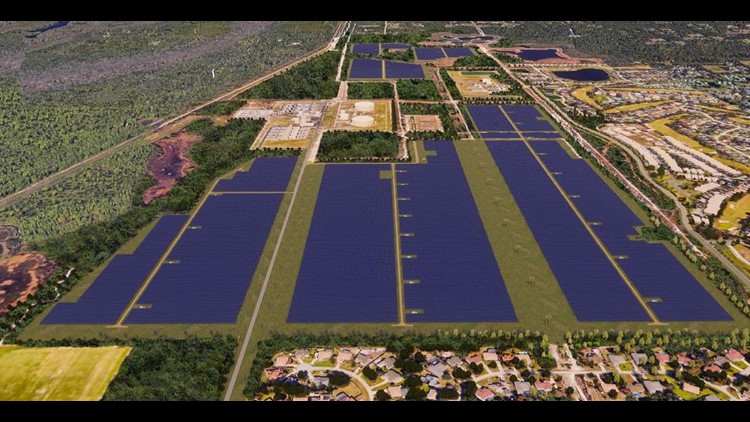TAMPA, Fla. — Duke Energy Florida announced the locations of its newest universal solar power plants, which will provide cleaner, smarter energy solutions to benefit Florida customers.
The Lake Placid Solar Power Plant will be built on 380 acres in Highlands County. The 45-megawatt (MW) plant will consist of approximately 180,000 tracking solar panels. The solar power plant is expected to be in service in December 2019 and will be owned, operated and maintained by DEF. DEF acquired the development rights to the project from EDF Renewables, and DEF is responsible for all remaining development activities, including construction.
Duke Energy is a paying sponsor of wtsp.com.
The Trenton Solar Power Plant will occupy about 580 acres in Gilchrist County. The 74.9-MW plant will consist of approximately 280,000 tracking solar panels, which will produce enough carbon-free energy to power over 23,000 average homes at peak production. It is expected to be in service in December 2019. The solar power plant will be owned, operated and maintained by DEF. DEF acquired the development rights to the project from Southeast Solar & Power LLC, and DEF is responsible for all remaining development activities, including construction.
The DeBary Solar Power Plant will be built on about 445 acres in Volusia County. The 74.5-MW plant will consist of approximately 300,000 fixed-tilt solar panels, which will produce enough carbon-free energy to power over 20,000 average homes at peak production. It is expected to be in service in March 2020. The solar power plant will be developed, owned, operated and maintained by DEF. DEF developed the project on company-owned land in the city of DeBary.
"These three solar power plants are expected to eliminate nearly 800 million pounds of carbon dioxide emissions in Florida each year upon commercial operation. That’s the equivalent of taking about 70,000 passenger cars off the road each year," said Catherine Stempien, Duke Energy Florida state president. “These projects represent our commitment to the environment and more fuel diversity in the state as we strategically pace the expansion of renewable generation for our Florida customers’ benefit."
DEF is investing an estimated $1 billion to construct or acquire a total of 700 MW of cost-effective solar power facilities through 2022.
By buying existing solar projects and using a competitive process to select DEF solar contractors, solar panels and project material suppliers, the company’s solar power plants bring the greatest amount of dependable renewable energy online for customers in the most efficient and economical way while creating more jobs in the solar and energy-related markets.
Last year, our Hamilton Solar Power Plant, sized at 74.9 MW, was placed in service in Jasper, Fla., and marked the fifth DEF-owned solar power plant in operation in Florida.
The previously announced 74.9-MW Columbia Solar Power Plant in Columbia County will be completed in March 2020. Together, with today’s announcement, DEF will have nine solar power plants in operation by the end of the first quarter of 2020.
Over the next decade, the company will also make innovative and targeted investments in additional solar power plants, battery storage technology, shared solar, transportation electrification and a modernized power grid to help meet customers’ needs for diverse, reliable energy solutions.
Florida Public Service Commission filing
Duke Energy Florida filed a request today with the Florida Public Service Commission to recover the estimated investment costs associated with the cost-effective Lake Placid, Trenton and DeBary solar power plants.
Solar technology has become less expensive and more efficient over time. Duke Energy has purposefully paced its solar investments over time to take advantage of these benefits for its customers.
The impact to residential customers’ rates for the Lake Placid project is estimated to be 22 cents per 1,000 kilowatt-hours (kWh).
The impact to residential customers’ rates for DeBary is estimated to be 33 cents per 1,000 kWh.
The impact to residential customers’ rates for Trenton is estimated to be 37 cents per 1,000 kWh.
Commercial and industrial customers would see approximately half a percent change or less per project.
For both the Lake Placid and Trenton solar power plants, the forecast base rate increase would begin in the January 2020 billing period.
For the DeBary Solar Power Plant, the forecast base rate increase would begin in the April 2020 billing period.
Duke Energy is a paying sponsor of wtsp.com.



